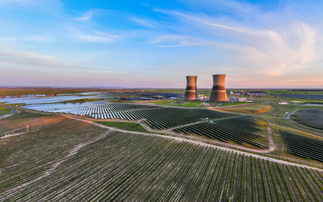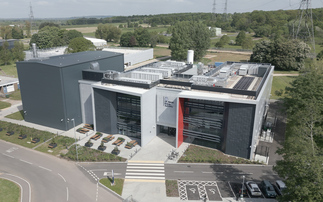Kirsty Gogan argues that with the Obama administration backing nuclear power as a mechanism for tackling climate change it is time for the Paris Summit to deliver a truly "technology neutral" approach to decarbonisation
It was surely no accident that on the same day that President Obama said "no" to the hugely controversial Keystone Pipeline, and just weeks before the COP 21 Climate Summit, he said: "yes" to nuclear energy. I was honored to be one of 177 invitees to the nuclear summit at the White House this month.
Obama's rejection of the Keystone XL Pipeline ends a seven-year saga with a declaration that the project is "not in the national interest and would undercut US global leadership in the fight against climate change". The White House said the rejection was key to bolster credibility as the US urges other nations to confront climate change. In the final weeks building up to COP21 in Paris, the rejection sends a diplomatic message as the Obama Administration works towards a global climate agreement.
In opening the White House Nuclear Summit, Dr. John Holdren, assistant to President Obama on science and technology and director of the White House Office of Science and Technology Policy, said: "President Obama considers addressing the global climate change challenge to be a top priority."
Political leadership of this kind is critical, given that average global temperatures have already risen by 1C since the industrial revolution. Paris is supposed to ensure that warming doesn't exceed 2C, even though the existing pledges made so far will amount to between 3C to 4C of warming by 2100, depending on your level of optimism or pessimism. Beyond that 2C threshold, scientists say severe and irreversible changes are likely. Whatever you think about arbitrary thresholds: going beyond 2C looks nothing short of disaster on an epic, heart-breaking scale.
In some cases, it's enough to make one change one's mind about nuclear. Dr Ken Caldeira, the famed climate scientist, speaking at the White House, confessed that he had once been arrested while protesting against Shoreham nuclear facility, but changed his mind about nuclear energy having studied climate science. He called on the environmental community to embrace "nuclear power as one of the very few technologies that can provide high density power in an environmentally acceptable way".
Bill Magwood, Director General of the OECD-NEA presented a new study, adding to the by now, surely, irrefutable mountain of evidence, that it is unrealistic to expect the world to achieve an 80 percent reduction in CO2 emissions by 2050 without a significant expansion of nuclear energy generation.
The 2C scenario developed by the OECD-NEA and International Energy Agency evaluates how world energy supply could be met while limiting global temperature increase to 2C. Perfectly deadpan, he proffered: "What this basically says is that this is going to be very difficult... We're going to have increase the use of renewables very dramatically. Solar will have to increase quite dramatically. Wind will have to increase dramatically. Carbon sequestration will have to be used quite significantly. We'll have to use more gas. And, we're going to have to use more nuclear." Stop press.
And yet, since 2001, when language was agreed at COP6, known as the Bonn Agreement, nuclear energy has been explicitly excluded from climate mitigation strategies, and nuclear projects have been prohibited from receiving financial assistance from the climate pact's sizable development mechanisms.
Were this language to remain intact it would contradict not only President Obama's US EPA's Clean Power Plan, but also undermine climate pledges (INDCs) submitted by countries including the China, India and Japan. It would prevent developed nations from counting the emissions reductions of nuclear plants constructed after 1997 toward their carbon target, even though the Clean Power Plan commits to using every available tool to cut carbon, including nuclear power, which already supplies more than 60 per cent of carbon-free power in the U.S.
In concert with the Nuclear for Climate campaign, we are urging the COP21 delegation to remove anti-nuclear language to ensure that in any agreement reached, "nations are free to pursue their clean energy commitments without arbitrary limitations on the technological pathways they choose". The draft text looks as though this is indeed the direction of travel: towards a technology neutral deal focused on carbon reduction, not renewables targets.
However, while the battle may have been won, the war is not. The devil will be in the detail, with anti-nuclear NGOs embedded in UNFCCC technical meetings, where nuclear could still easily be locked out e.g. excluded from finance mechanisms. Without such an army of UNFCCC experts to police this, our best chance is to ensure that it will be politically and socially unacceptable for nuclear to be excluded.
A global media alert has been issued to announce that Dr Caldeira, together with Dr. James Hansen, Dr. Tom Wigley, and Dr. Kerry Emanuel, will host a major press conference in Paris on 3 December. They will challenge environmental leaders who still hold anti-nuclear positions to instead support development and deployment of safe and environmentally friendly nuclear power. For example, the Climate Action Network, representing all the major environmental groups, still insists, despite all evidence to the contrary that "nuclear has no role to play in a fully decarbonised power sector". The four pioneers of climate science will state that the anti-nuclear position of these environmental leaders is in fact causing unnecessary and severe harm to the environment and to the future of young people.
A key outcome in Paris will be whether the current widespread institutional, ideological insistence on investing time and effort in exploring renewables-only pathways will be abandoned in favour of a technology neutral deal that reflects the urgency and scale of the challenge we face. The climate emergency demands a combined strategy of nuclear and renewables that can deliver the best outcomes at the lowest cost; with priority given to lifting billions of people out of grinding poverty to achieve some of the quality of life that we take for granted.
Summary of announcements by the Obama Administration on actions to help sustain and finance nuclear energy:
- $900m in the Department of Energy's 2016 budget to support commercial nuclear energy
- Supplement DOE's existing $12.5bn in loan guarantees for nuclear energy projects
- Launch the Gateway for Accelerated Innovation in Nuclear (GAIN), coordinated by the Idaho National Laboratory, to provide outside researchers access to nuclear energy-related capabilities and expertise within the DOE complex. This is needed to bring advanced nuclear reactor designs to commercialization, at the same time ensuring the continued safe, reliable, and economic operation of the existing nuclear fleet
- Make $2m available in the form of vouchers to small businesses entrepreneur-led start-ups for assistance in obtaining nuclear know-how from our National Lab system
- Provide support to small modular reactor licensing, simulation and control room development for light-water reactors.
The whole line up of exceptionally high quality speakers at the White House is available to watch on YouTube. The introduction by Dr Holdren is superb, as was the speech on national security by Susan Eisenhower, granddaughter of President Eisenhower of Atoms for Peace fame, and a genuine force of nature in her own right. Enjoy!
And remember: put technology differences to one side, and put the climate first.
Kirsty Gogan is co-founder and executive director of Energy for Humanity
This article is part of BusinessGreen's Road to Paris hub, hosted in association with PwC.







